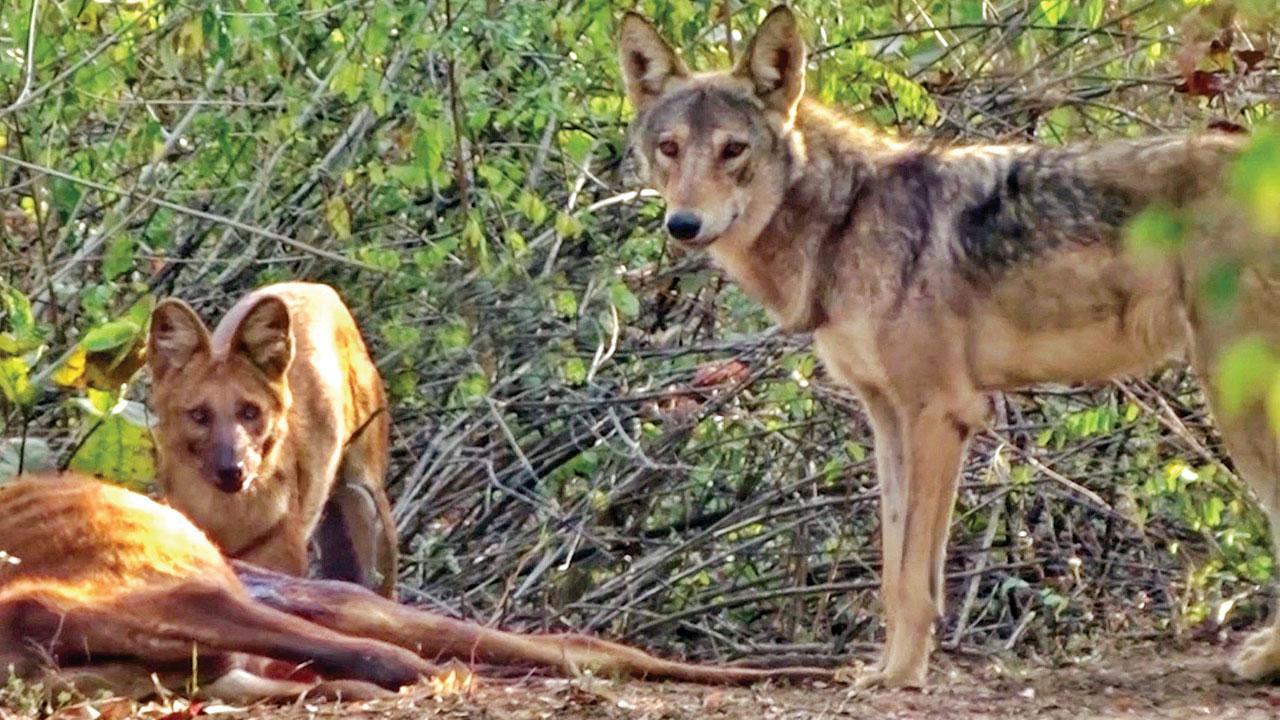A pack of dholes - Asiatic wild dog - photographed with a wolf at Satpuda Tiger Reserve; these animals have never been seen interacting with each other

In the first interaction, the (right) wolf was seen trying to feed on the same carcass as the dholes. Pic/Jesan Das
In what can be termed as the first record of mixed species association in India, a pack of dholes and a wolf were photographed together at Satpuda Tiger Reserve in Madhya Pradesh. A scientific paper about the same has been published recently in the renowned journal, Canid Specialist Group. The authors of the paper are Pallavi Ghaskadbi, Bilal Habib, Jesan Das and Vineith Mahadev.
ADVERTISEMENT
‘Opportunistic feeding attempt’
According to the paper, “The first dhole-wolf interaction was recorded on a vehicle safari on 16th March 2020 in the Bagra Tourism Zone of STR. The dhole pack of seven was observed feeding on a cattle carcass and exhibited agonistic behaviour towards a wolf which tried to feed on the same carcass. Intra-pack aggression in dholes has been reported when kills were small and has also been reported in wolves and foxes. Kleptoparasitism has been observed between dholes, tigers, and leopards in Tadoba Andhari Tiger Reserve. However, this observation seemed more like an opportunistic feeding attempt by the lone wolf which was chased away by the dhole pack.(SIC)”
The paper further said, “On the second occasion, 26th October 2020, a lone male wolf was observed walking along with the dhole pack of four individuals (two males, one female, and one unknown sex). No apparent agonistic interactions were observed between the dholes and the wolf. The observation was approximately 6 km from the first dhole-wolf interaction which indicates that it may be the same dhole pack and wolf. Based on the second observation after six months, it seems possible that the wolf may have become a part of the dhole pack or associated with the pack temporarily.(SIC)”
The research paper states that the Asiatic wild dog or dhole is the only endangered, social canid in the tropical Indian forests. The Indian grey wolf is another social canid found in India in grassland ecosystems and agro-forestry landscapes in human dominated areas. The two species co-occur in some regions, but their ecological niches overlap little with each other.
The possible reasons for the wolf’s association with dholes in terms of mixed species group interactions are discussed in the paper. The observations raise interesting ecological questions about the dynamics of dhole-wolf interactions in this region, and the impact of these interactions on the conservation of both the endangered dhole and wolves in central India.
What experts say
Senior scientist Dr Bilal Habib from the Wildlife Institute of India (WII) said, “This record is significant considering the atypical interspecies inter-actions, population status, effects of habitat loss, fragmentation, and conservation of the two canid species in India. Both of these social canid species, dholes and wolves, are under tremendous threat from habitat fragmentation and habitat loss. To sustain viable populations of the endangered dholes and wolves, a landscape approach in conservation planning needs to be adopted.”
 Subscribe today by clicking the link and stay updated with the latest news!" Click here!
Subscribe today by clicking the link and stay updated with the latest news!" Click here!







